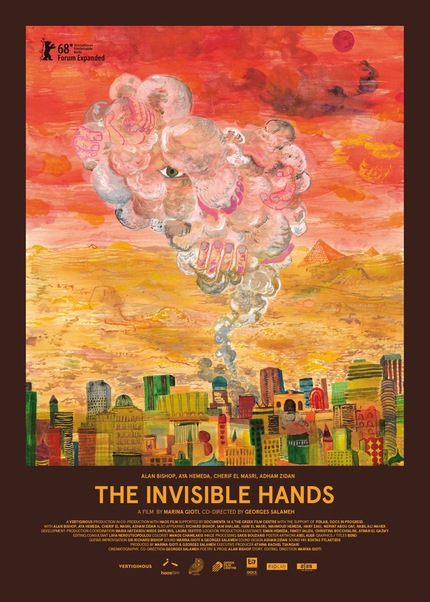Berlinale 2018 Review: THE INVISIBLE HANDS, An Unlikely Meeting of Cultures Yields Strange and Beautiful Results
Marina Gioti and Georges Salameh directed the documentary.

The Invisible Hands, an excellent documentary by Marina Gioti and Georges Salameh, explores the unlikely collaboration between American musical provocateur Alan Bishop and a group of young Egyptian musicians whose lives were upended by the Arab Spring. The film's international premiere is occuring this month at Berlinale. The Asian premiere is at Tokyo's Yebisu International Festival for Art & Alternative Visions, which also takes place this month.
In the late '70s, Alan Bishop (aka Alvarius B.), Richard Bishop and Charles Gocher formed the avant-rock band Sun City Girls. The group mixed punk, improv, ethnic music, glossolalia and whatever else into a singular genre-bending sound (e.g. listen to the group's album Torch of the Mystics). After Gocher's death in 2007, the group disbanded and the songs, most of which were written by Alan, were put on the shelf. The Bishop brothers continued with various music endeavours, which have been documented on countless releases. Alan Bishop also started the Sublime Frequencies music label, which releases music that was either recorded or discovered during his wide and varied international travels. Many people know Sublime Frequencies as the label that introduced Syrian musician Omar Souleyman to the West.
All of this background brings us to The Invisible Hands. The Bishop brothers visited Cairo, Egypt in 2010 for a series of performances. The Arab Spring was just beginning to stir in the Middle East and by 2011, the revolution spread to Egypt where Hosni Mubarak was replaced by Mohammed Morsi of the Muslim Brotherhood. In 2012, Alan Bishop returned to Cairo with a new mission: to translate his old Sun City Girls songs into Arabic and record the songs with a new band. He recruited, among others, Cherif El Masri and Aya Hemeda from the group Eskenderella as well as Adham Zidan and Magued Nagati. Throughout the lingering political upheaval, the musicians completed an album under the name The Invisible Hands (hence the name of the documentary).
Co-directors Marina Gioti and Georges Salameh followed Alan Bishop for the duration of his five-year Egyptian journey and captured the entire process of recording The Invisible Hands' self-titled album. Since Bishop is at the center of the story, viewers who are not familiar with his background might be a bit confused about why a documentary was made about him. Prior knowledge of Bishop's background certainly enhances the documentary experience but the filmmakers do a good job of explaining--and showing--who he is and why he matters through the use of spoken word segments, old interviews and music performances. This archive material combined with the presentation of Bishop in more recent years builds the image of an immensely talented yet cantankerous world traveler who speaks with a sardonic rasping tone that recalls William Burroughs and a seriously old-fashioned chain-smoking habit.
Eschewing the impulse to impose a contrived narrative arc upon the events that it portrays, The Invisible Hands captures the ebbs and flows of the creative process as well as the impact of the tense political environment on all of the film's subjects. Observing Alan Bishop as he curses and smokes his way through one awkward situation after another is equally entertaining and confusing. As film progresses, the method behind Bishop's madness reveals itself. Through decades of travelling and performing music, he has gained the ability to navigate unfamiliar cultural territory while also communicating and executing highly unorthodox musical ideas. Bishop really knows what he is doing. Despite the fact that many of his surreal profane lyrics don't easily translate into Arabic and his compositions aren't accessible to general audiences, the collaboration between Bishop, Cherif El Masri, Aya Hemeda, Adham Zidan and others coalesces to produce some very haunting and powerful music. The Egyptian artists also use the music and the lyrics as a new vehicle to express their own creativity and frustration in ways that were not otherwise available to them.
In a time in which the world seems locked into perpetual political conflict, The Invisible Hands is an affirmation that creative people from highly divergent backgrounds can still unite to create strange--and beautiful--art.







